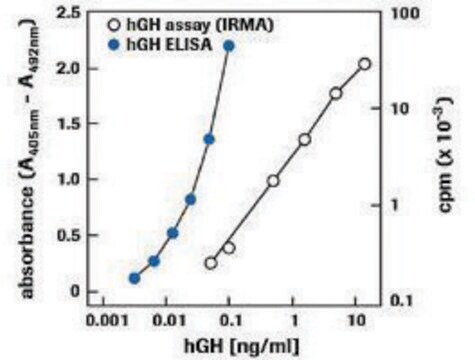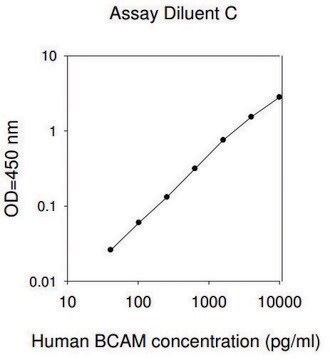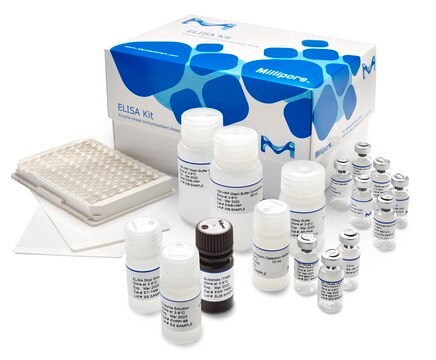CYT420
Human Pigment Epithelium Derived Factor ELISA Kit
measures and quantifies PEDF levels in Neuroscience research
Synonym(s):
PEDF
About This Item
Recommended Products
product name
ChemiKine Pigment Epithelium Derived Factor, Sandwich ELISA, This ChemiKine Pigment Epithelium Derived Factor, Sandwich ELISA is used to measure & quantify PEDF levels in Neuroscience research.
biological source
mouse
Quality Level
clone
monoclonal
species reactivity
human
manufacturer/tradename
ChemiKine
Chemicon®
technique(s)
ELISA: suitable
NCBI accession no.
UniProt accession no.
application(s)
research use
detection method
colorimetric
shipped in
wet ice
Related Categories
General description
Pigment Epithelium-Derived Factor (PEDF) was first identified as a factor secreted by primary retinal pigment epithelial (RPE) cells that promotes the survival of neurons in vitro and in vivo. Molecular characterization of PEDF shows it to be a 50 kDa member of the serpin family of protease inhibitors1. A second mode of action of PEDF was identified with the demonstration that PEDF induces apoptosis of microvascular endothelial cells, a property that maintains the avascular nature of the retina2. As a number of ophthalmologic disorders are characterized by dysregulation of the retinal innervation and microvasculature, PEDF serves as an important regulator of human eye disease3. In addition, PEDF appears to have multifunctional antitumor activity in a neuroblastoma model, as Schwann cell-derived PEDF induces a differentiated, less malignant phenotype in neuroblastoma cells, promotes further growth and survival of Schwann cells, and inhibits angiogenesis4.
ChemiKine Pigment Epithelium-Derived Factor (PEDF) kit is a sandwich stripwell-type enzyme immunoassay (EIA), which measures PEDF. The kit will measure PEDF of vitreous fluid of human origin.
Test Principle
With the ChemiKine PEDF assay system, a mouse monoclonal antibody generated against human PEDF is coated onto a microplate and is used to capture PEDF from a sample. A second, biotinylated PEDF-specific mouse monoclonal antibody detects the captured PEDF. Peroxidase-labeled streptavidin detects the biotinylated mouse monoclonal antibody. After addition of the substrate and stop solution the amount of PEDF is determined. The standard curve demonstrates a direct relationship between Optical Density (OD) and PEDF concentration: i.e., the higher the OD the higher the PEDF concentration in the sample.
Application
For Research Use Only. Not for use in diagnostic procedures.
Neuroscience
Neurochemistry & Neurotrophins
Components
Wash Buffer Concentrate: (Part No. 60245) One 100 mL (10X) bottle of Concentrate.
Assay Diluent: (Part No. 60240) One 60 mL bottle (Ready to Use).
PEDF Standard (Human): (Part No. 61600) One vial containing 250 ng recombinant full length human PEDF (Lyophilized).
Biotinylated Mouse anti-Human PEDF Monoclonal Antibody: (Part No. 61598) One 50 μL vial.
Streptavidin, HRP conjugated: (Part No. 61599) One 50 μL vial.
TMB/E Solution: (Part No. 60096) One 10 mL bottle of a Ready to Use solution of 3,3′,5,5′-tetramethylbenzidine in a proprietary buffer with enhancer.
Stop Solution (Part No. 60193): One 12 mL bottle of an HCl solution (Ready to Use).
Storage and Stability
Precautions
· Wash Buffer and Assay Diluent contain thimerosal. Thimerosal is highly toxic by inhalation, contact with skin or if swallowed. Thimerosal is a possible mutagen and should be handled accordingly.
· The instructions provided have been designed to optimize the kit′s performance. Deviation from the instructions may result in suboptimal performance of the kit and the failure to produce accurate data.
Legal Information
Disclaimer
Signal Word
Warning
Hazard Statements
Precautionary Statements
Hazard Classifications
Aquatic Chronic 2 - Eye Irrit. 2 - Met. Corr. 1 - Skin Irrit. 2 - Skin Sens. 1
Storage Class Code
8A - Combustible, corrosive hazardous materials
WGK
WGK 3
Certificates of Analysis (COA)
Search for Certificates of Analysis (COA) by entering the products Lot/Batch Number. Lot and Batch Numbers can be found on a product’s label following the words ‘Lot’ or ‘Batch’.
Already Own This Product?
Find documentation for the products that you have recently purchased in the Document Library.
Our team of scientists has experience in all areas of research including Life Science, Material Science, Chemical Synthesis, Chromatography, Analytical and many others.
Contact Technical Service








